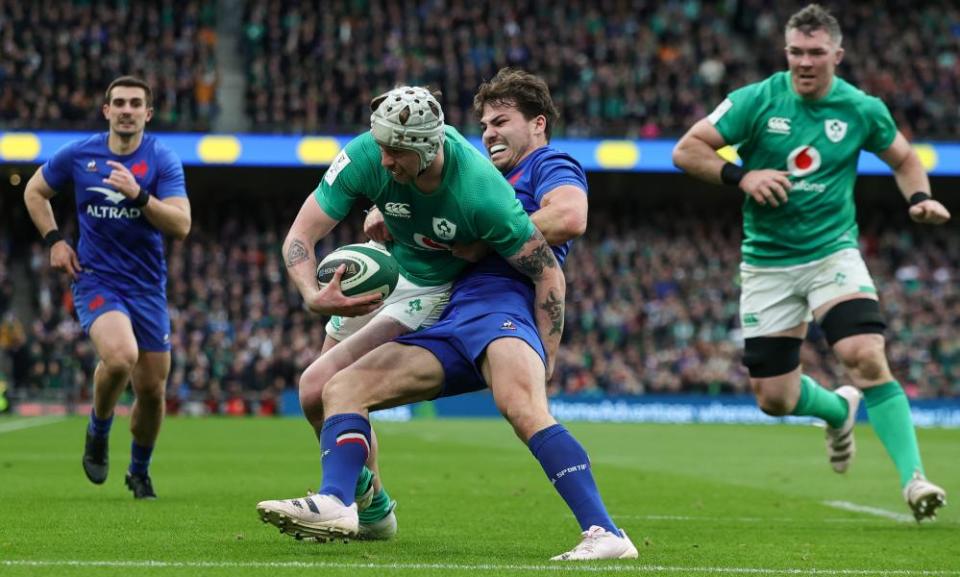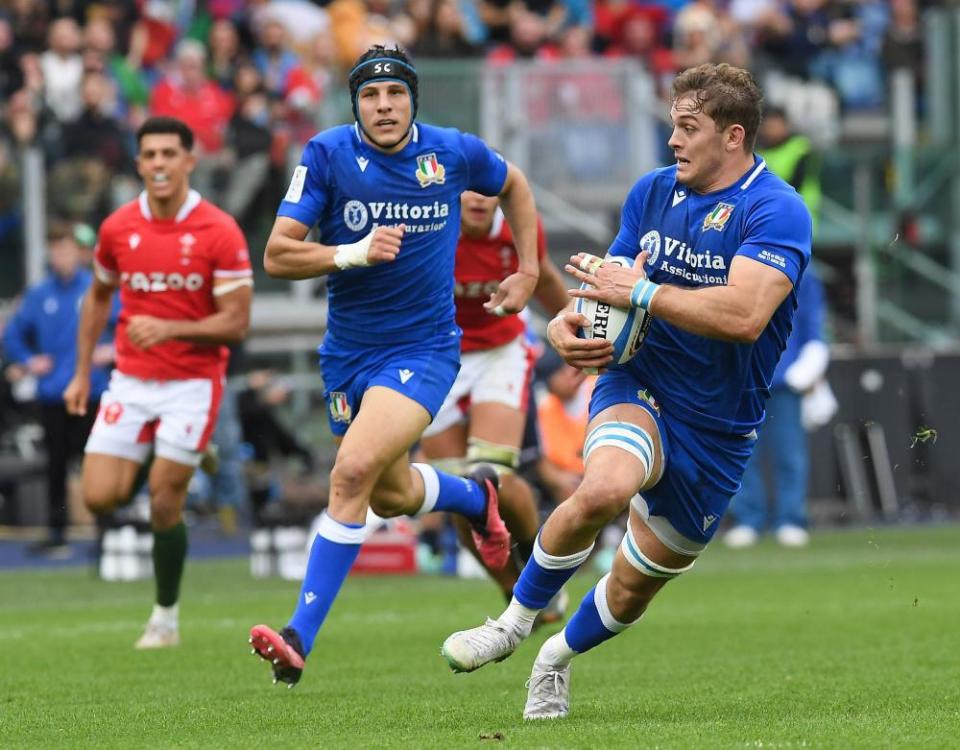Six Nations verdict: dominant Ireland and super Dupont take the plaudits

Player of the tournament
France may not have won the title but, once again, they possessed the best player in the tournament. Antoine Dupont was so good against England it was almost laughable: sharp, clever, strong, able to kick off both feet … if he looked slightly weary at the start of the championship, he was back to his best by the end of it. Damian Penaud, Jonathan Danty, Hugo Keenan and Caelan Doris also deserve honourable mentions.
Match of the tournament
Ireland 32-19 France. Not just the game of this championship but the best, quality-wise, in many years. The only shame was that it was not a final-weekend title decider. Will there be a compelling sequel at the World Cup this year?
Try of the tournament
Plenty to choose from, not least Penaud’s final try in the Twickenham rout against England and James Lowe’s flying finish (allegedly) in the corner against France. The try that set the tournament alight, though, was Scotland’s winning score in the 74th minute against England. Duhan van der Merwe had already scored an individual beauty, assisted by some mediocre tackling, but his second, with England leading 23-22, showcased Scotland’s improved all-round attacking game.

Most improved player
Thibaud Flament (France). It is a cliche these days to mention that, not long ago, he was playing in the lower XVs at Loughborough University. The former Wasps forward is increasingly a poster boy for late developers everywhere.
High points
1) Shortly before half-time in Dublin last month Ireland were leading France 19-16. After a kick ahead by Keenan, Mack Hansen picked up the ball a couple of metres out and looked certain to score until Dupont grabbed the winger just above the waist and somehow had the strength to stop him in his tracks. It was like watching Asterix, suitably fortified by the magic potion supplied by Getafix, his village druid.
2) France’s win at Twickenham. At times they were truly magnifique.
3) The anthems in Cardiff before Wales v England. There are few better moments in sport.

Low points
1) Italy’s first half at Twickenham. England, having lost against Scotland, were there for the taking, but the Azzurri could not grasp the opportunity.
2) Wales. At least there were glimmers of hope late on against France.
3) England supporters leaving before the end of the France game. They should have stayed to applaud the outstanding visitors off.
4) The beer shower that rained down on the Twickenham press box towards the end of the Italy match, coming perilously close to ruining several laptops with deadlines looming. A pint costs too much to chuck around these days.
Most telling statistics
1) Ireland were behind on the scoreboard for just 54 minutes all tournament and never at any stage in the second half of their matches.
2) England averaged three line-breaks per game during the Six Nations, the lowest of any team in the championship and their lowest return since 2012.
3) A total of 91 tries were scored in this Six Nations, the highest number recorded. The previous record was 86 in 2021.
Rising stars
1) Lorenzo Cannone (Italy). “Florence Dallaglio” is definitely one to watch.
2) Tommaso Menoncello (Italy). Another of Italy’s exciting new generation.
3) Ollie Chessum (England). Now out for the rest of the season but looks to have a lengthy Test career ahead of him.

In 2024 let’s hope for …
1) Improvements to the TMO red-card decision process for head clashes. It makes increasing sense for players to be sent to the sin-bin for 10 minutes initially if no deliberate foul play is involved. Then, if a red card is clearly justified, they stay off.
2) A successful experiment when France host Six Nations games outside Paris because the Stade de France is being redeveloped. Biennial games in the south of France, anyone?
3) Structural reform in both English and Welsh rugby. If not, Ireland and France will be in a league of their own for a while.
Quotes of the tournament
“As I said in the dressing room, this is not the end. There is plenty more left in this team” – Ireland’s captain, Johnny Sexton, after his side’s grand slam-clinching win in Dublin.

“I hope that teams are scared of us now. We’re certainly the team to beat” – France’s head coach, Fabien Galthié, fears nobody before the World Cup this autumn.
“There was quite a significant split in the group over which way to go, and I think that definitely caused some tension within the group for a couple of weeks” – Warren Gatland reveals the impact of Wales’s strike threat before the game against England in Cardiff last month.
“I don’t actually hate English people” – Ireland wing Mack Hansen rows back from his pre-match suggestion that “everyone hates the English”.
“When I looked at the team in the autumn, and got all the data, we weren’t good at anything” – England’s head coach, Steve Borthwick, on the pre-tournament legacy he inherited from Eddie Jones.
“We don’t want multiple Six Nations with only a couple of wins. We want to be at the top of the championship” – Borthwick again after his side had finished fourth in the table.
Team of the tournament
H Keenan (Ire); D Penaud (Fr), G Ringrose (Ire), J Danty (Fr), D van der Merwe (Sco); F Russell (Sco), A Dupont (Fr); C Baille (Fr), D Sheehan (Ire), F Bealham (Ire), T Flament (Fr), J Ryan (Ire), S Negri (It), J van der Flier (Ire), C Doris (Ire).
This is an extract from our weekly rugby union email, the Breakdown. To subscribe, just visit this page and follow the instructions.

 Yahoo News
Yahoo News 